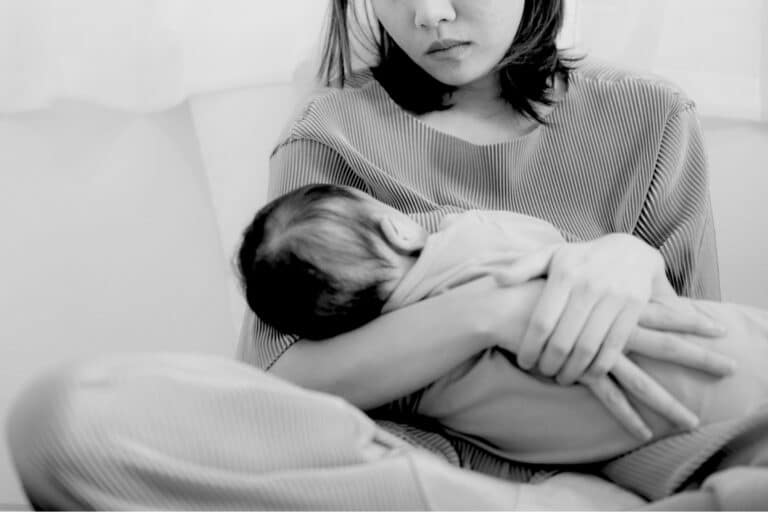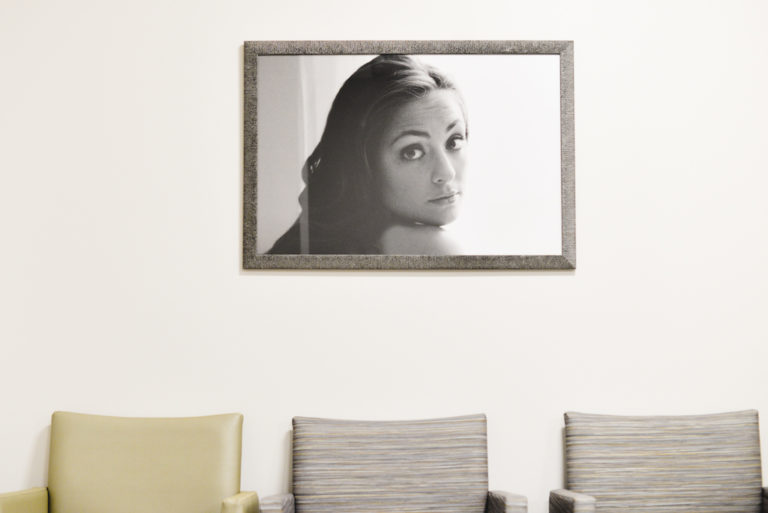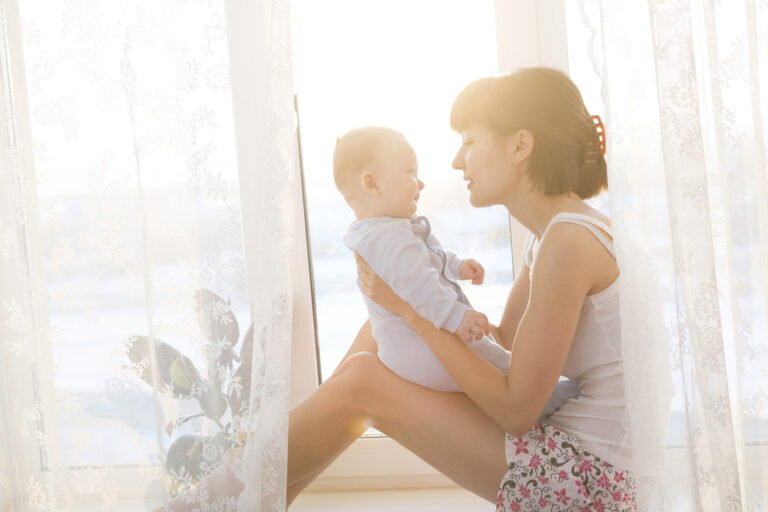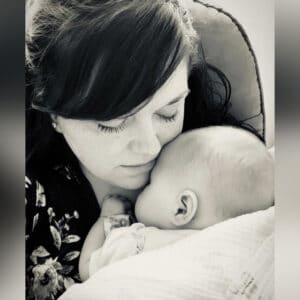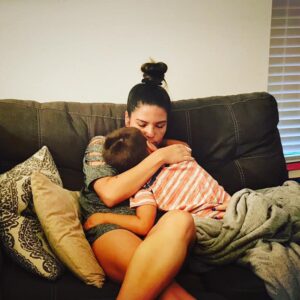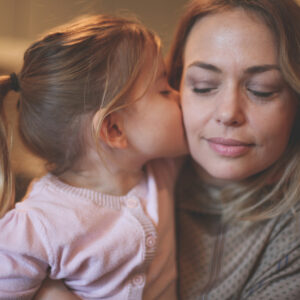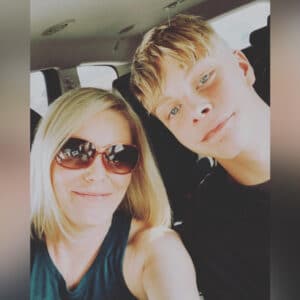Being a NICU mom, my baby and I went through our share of traumatizing events. Somehow, not a single professional asked me if I was OK during that time. I actually had no idea that I wasn’t.
I cried hard every day, but I thought that was just normal.
I was somewhat functioning. I mean, I could eat a few meals a day, make my own smoothie, get dressed, pack up and clean all my pump supplies, and get a few hours of sleep in between pump sessions at night.
All I could think was, I just want to bring my baby home. That thought consumed me. I would convince myself that “once he’s home, I can do things MY way, I won’t be at the mercy of the nurses and doctors, and we can start bonding.”
A little over five weeks after my son was born, that day came. I was happy, relieved, and couldn’t wait to get out of that hospital.
Then, my memories get really foggy.
Everything seemed to be so difficult. I wanted to breastfeed, but he couldn’t yet. So I continued to pump around the clock and feed him breastmilk from a bottle. I soon began to despise pumping. It made me feel trapped. Pumping became a trigger for me. My entire day was based around when I had to pump. It was one thing I could control, yet it seemed to control me. Even If I wanted to stop (which I realized I didn’t because I wanted to breastfeed), I couldn’t just stop right then. I’d have to wean slowly, so I didn’t get more plugged ducts (I’d had so many already), mastitis, or significant pain.
RELATED: A New Mom Can Feel Blessed and Thankful and Still Battle Postpartum Anxiety
As a preemie, my son slept pretty much all day until he started to reach his full-term age (he was born at 32-weeks.) Then he started acting less like a preemie and more like a typical newborn. This meant he slept less, started fighting sleep, and actually was awake for some parts of the day needing more attention.
Somewhere in the midst of all this, I stopped functioning.
I couldn’t fall asleep at night, which has never been a problem for me. I couldn’t sleep during the day either. People kept saying just go take a nap. Well, I literally couldn’t. I would just lay there, mind racing, trying to force myself to fall asleep, but then feel guilty that I wasn’t with my baby, and it felt like my heart was going to beat out of my chest.
I stopped eating. I couldn’t keep anything down. I remember being able to eat a little bit in the morning and maybe a smoothie. But by 3 p.m. every day, I’d be physically ill. I tried to force down oatmeal for dinner, but most nights I couldn’t.
I started having panic attacks. At the time, I had no idea that’s what was happening. I always felt some level of anxiety throughout the day, but at 3 p.m. or later, a full-blown panic attack would consume me for what felt like hours. I would shake violently, have uncontrollable crying spells, and then become totally immobile. I would sit or lie down on the couch and then be unable to move. I couldn’t hold my baby or even look at him. I couldn’t change his diaper. I felt like my body was being held down by lead weights.
I just felt so heavy.
Then everything began to hurt. My entire body ached in a way that is indescribable. I’ve dealt with chronic pain most of my life, but this was different. This was pain I was unable to pinpoint. Pain that couldn’t be relieved by positioning or rest. This was intense, emotional pain that fled out and overtook my body.
I craved my mom and sister. Unless one of them were with me, I didn’t feel safe. (My husband was the most helpful person, but I would later learn needing my mom and sister was a primal instinct or need).
One particularly dark afternoon, I was unable to get my son down for a nap. I swaddled him and held him in bed and just waited, frozen, until my husband got home from work. He immediately came and cared for our son. I stayed there, unable to move. The rest of the night, all I could think was I want to be hurt bad enough that I could go to the hospital to be taken care of.
Later, I learned that I was hurt bad enough. I didn’t have an infection. I didn’t have a broken bone. I didn’t have a heart attack.
But what I did have was severe postpartum depression, anxiety, and PTSD.
I probably should have been hospitalized.
Mental health issues are tricky. They can be invisible to others, yet all-consuming to the person afflicted. They can be unrecognizable in the moment to the person experiencing them, yet so obvious once looked back upon. And if the people around you don’t advocate for you, you can get lost so easily.
RELATED: New Mom Takes Her Own Life After Silent Battle With Postpartum Depression: Why All Of Us Must Share Her Friend’s Plea
My story doesn’t end this way. In fact, it actually has a very happy ending. I was fortunate enough to have a husband, a mother, and a sister to get me the care I so desperately needed. For that, I am forever grateful.
Five years later, I am revealing my journey to raise awareness and help others.
I had no history of mental illness. I had no education on postpartum mental health issues and I didn’t know what the warning signs could be. I didn’t know what was normal and what wasn’t. I didn’t have a support plan. I had no idea what my options were, or who could help me.
If there is anything you can take away from my story, it’s to educate yourself on postpartum mental health. Know the signs and symptoms of postpartum anxiety, depression, PTSD, OCD, psychosis. Know your local resources and who to call right away if you suspect you or a loved one are experiencing these symptoms. Know your emergency numbers and hotlines available to you. Make a plan (even if the plan is just “call mom”) for asking for additional support. Get the name and number of a therapist, just in case. Educate your loved ones and the ones around you about all these things, too. Others need to know how to respond without you asking.
Start by visiting by visiting www.postpartum.net for a multitude of education, resources, and support.
Disclaimer: This is not medical advice. If you are in a medical emergency, call 911.
Postpartum Support International: Call the helpline at 1-800-944-4773
#1 En Español or #2 English. The PSI HelpLine does not handle emergencies. People in crisis should call their local emergency number or the National Suicide Prevention Hotline at 1-800-273-TALK (8255).

If you liked this, you'll love our book, SO GOD MADE A MOTHER available now!
Order NowCheck out our new Keepsake Companion Journal that pairs with our So God Made a Mother book!
Order Now

